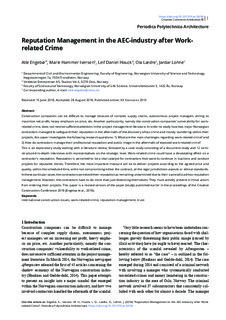| dc.contributor.author | Engebø, Atle | |
| dc.contributor.author | Iversen, Marie Hammer | |
| dc.contributor.author | Houck, Leif Daniel | |
| dc.contributor.author | Lædre, Ola | |
| dc.contributor.author | Lohne, Jardar | |
| dc.date.accessioned | 2019-04-09T07:13:49Z | |
| dc.date.available | 2019-04-09T07:13:49Z | |
| dc.date.created | 2019-01-04T01:37:38Z | |
| dc.date.issued | 2018 | |
| dc.identifier.citation | Periodica Polytechnica Architecture. 2018, 49 (2), 176-184. | nb_NO |
| dc.identifier.issn | 0324-590X | |
| dc.identifier.uri | http://hdl.handle.net/11250/2593784 | |
| dc.description.abstract | Construction companies can be difficult to manage because of complex supply chains, autonomous project managers aiming to maximize net profit, heavy emphasis on price, etc. Another particularity, namely the construction companies' vulnerability for work-related crime, does not receive sufficient attention in the project management literature. In order to study how two major Norwegian contractors managed to safeguard their reputation in the aftermath of the discovery of tax crime and money laundering within their projects, this paper investigates the following research questions: 1) What are the main challenges regarding work-related crime? and 2) How do contractors manage their professional reputation and public image in the aftermath of exposed work-related crime?
This is an exploratory study starting with a literature review, followed by a case study consisting of a document study and 12 semi-structured in-depth interviews with representatives on the strategic level. Work-related crime could have a devastating effect on a contractor's reputation. Reputation is perceived to be a vital catalyst for contractors that want to continue in business and conduct projects for reputable clients. Therefore, the most important measure will be to deliver projects according to the agreed price and quality, within the scheduled time, while not compromising either the contract, all the legal jurisdictions aspects or ethical standards. In these particular cases, the contractors perceived their reputation as remaining untarnished due to their successful ad-hoc reputation management. However, the contractors have to do more than just distancing themselves. They must actively prevent criminal actors from entering their projects. This paper is a revised version of the paper (study) published earlier in the proceedings of the Creative Construction Conference 2018 (Engebø et al., 2018). | nb_NO |
| dc.language.iso | eng | nb_NO |
| dc.publisher | Faculty of Architecture of the Budapest University of Technology and Economics. | nb_NO |
| dc.rights | Navngivelse 4.0 Internasjonal | * |
| dc.rights.uri | http://creativecommons.org/licenses/by/4.0/deed.no | * |
| dc.title | Reputation Management in the AEC-Industry after Work-related Crime | nb_NO |
| dc.type | Journal article | nb_NO |
| dc.type | Peer reviewed | nb_NO |
| dc.description.version | publishedVersion | nb_NO |
| dc.source.pagenumber | 176-184 | nb_NO |
| dc.source.volume | 49 | nb_NO |
| dc.source.journal | Periodica Polytechnica Architecture | nb_NO |
| dc.source.issue | 2 | nb_NO |
| dc.identifier.doi | 10.3311/PPar.12696 | |
| dc.identifier.cristin | 1650026 | |
| dc.description.localcode | © The Authors. This is a diamond open access journal.: publishing and downloading articles are both free of charge. The journal does not charge authors any article processing charges (APCs), submission, or publication fees. Users have the right to read, download, copy, distribute, print, search, or link to the full text of these articles. | nb_NO |
| cristin.unitcode | 194,64,91,0 | |
| cristin.unitname | Institutt for bygg- og miljøteknikk | |
| cristin.ispublished | true | |
| cristin.fulltext | original | |
| cristin.qualitycode | 1 | |

